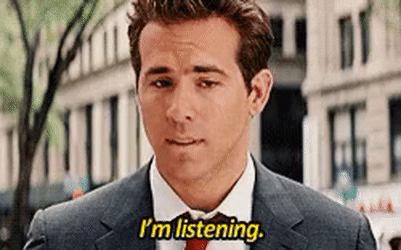
When you asked a friend how they were going in 2020, you were far more likely to get a genuine answer as opposed to the usual “Yeah, good.” Never before have we all experienced so much change, all at the same time, so it’s not at all surprising that it took its toll on many people’s mental health.
So if one of your friends decides to confide in you about their own problems (because we could all do with a bit of extra support from time to time), it’s crucial that you respond appropriately.
It’s normal to try and relate to a friend when they share the intimate details of their mental health. Using your past experiences and thinking about what you needed in those moments can be helpful in understanding where your friend is coming from and figuring out what you can do to support them. But we’re here to ~gently~ suggest you do that privately.

It can be tempting to compare your own mental health experiences with your friend’s, but when we vocalise these thoughts, it can come across as downplaying or not validating their feelings.
This has helped me to remember that everything is relative. So, what someone else sees as the hardest thing they’ve ever experienced could be a cakewalk for me. But my breezy attitude won’t help to calm them down, and it could actually come across as me downplaying their experiences and seeming unsupportive. And that’s the opposite of helpful.
When I removed comparisons from my conversations and replaced them with the simple tips below, it helped me become a better friend and allowed me to support my loved ones way better.
Really listen to what they’re saying

Okay, this sounds obvious, but it’s important. Remember that when a friend opens up to you about their mental health, they’ll probably be feeling extremely vulnerable. For that reason, giving them your undivided attention is really important.
Don’t search for your in to make a point or try to change the subject before they’re ready. Instead, give them your undivided attention. Focus on what they’re really saying, ask questions about how long they’ve been feeling this way, and make sure they feel properly heard.
Validate their feelings

Most of us have been guilty of downplaying our own mental health because we’ve felt that our problems were nothing in comparison to what other people are going through. In reality, all mental health issues are unique and valid. If your friend’s worked up the courage to confide in you, it’s a big deal. So, make sure you resist comparing their situation to your own and instead, validate their feelings.
For example, according to Queensland Health, it’s natural to feel worried, stressed, lonely, or overwhelmed — particularly in the past year, where nothing felt normal. But if those feelings stop being an occasional occurrence and start creeping into all areas of your life, preventing you from performing day-to-day tasks, that’s when it’s time to get help. By validating your friend’s mental health concerns and not letting them brush over what they’re experiencing, it may help them take that next step and seek professional help.
Don’t try to fix their problems

It can be tempting to immediately switch into fix-it mode when your friend shares their mental health issues with you. But chances are, they didn’t come to you for a solution. Nope, they probably just want someone to listen and appreciate what they’re going through.
Instead of offering lengthy advice or suggesting how they can fix their problems, sometimes the best way to support a friend is to just be compassionate and tell them you’re always there to listen. Often, all people want to hear is “I’m sorry. That sounds really hard. I’m here for you.”
Encourage them to seek professional help for their mental health

If you’re the first person your friend has spoken to about their mental health, it might be a good time to encourage them to seek professional help. This is a daunting step for anyone, but online resources like this one by Queensland Health are useful for breaking down exactly what will happen when they start down the road to getting help.
Likewise, it’s important to recognise your own limits too, and remember to try your best not to take on the problems of your closest friends and family as your own. Supporting them is one thing, but it’s important to look after your own mental health at the same time.
If you become concerned for the welfare of your friend, remember that telephone services like Lifeline (13 11 14) and Beyond Blue (1300 224 636) are available for around the clock support. You can also find more support services on the Your Mental Wellbeing website.







